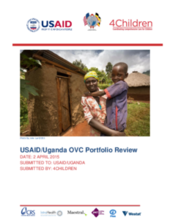HIV and AIDS continue to be a major contributing factor to vulnerability in Uganda. High HIV prevalence alongside economic challenges, internal migration, family breakdown and other illnesses have resulted in significant numbers of orphans and vulnerable children. These children have faced significant shocks and adversities, but have typically lacked access to a spectrum of supports and services. In addition, many have been unable to access the traditional mechanisms of extended family care that were available prior to the epidemic. In response to the wide-range of vulnerabilities faced by orphans and vulnerable children in Uganda, USAID and its implementing partners are managing a portfolio of projects designed to improve government social welfare and health care systems, support HIV/AIDS care and treatment programs, promote health messages and support household economic strengthening. The goal of the current USAID Orphans and Vulnerable Children Strategy (the “Strategy”) is: Improved health, nutrition, and psycho-social well-being and reduced abuse, exploitation and neglect among children affected by HIV and AIDS.
The USAID Mission in Uganda requested a review of the portfolio of OVC programming in Uganda. The original Scope of Work (SoW) requested an up to date analysis of information collected through a desk review and key informant interviews of the strengths, weaknesses, opportunities and threats (SWOT) of the Strategy. Upon further discussion with representatives of the Mission, the SoW was reassessed and a specific focus on several priority issues was included: (1) targeting case management and referral mechanisms; (2) graduation; (3) links with HIV/AIDS care and treatment partners; and (4) overall coordination amongst implementing partners. Although the overall review was completed within a SWOT, the main content of the portfolio review is structured around these core components of the Strategy.
The 4Children team adopted a primarily qualitative approach for the Portfolio Review. Primary qualitative data was collected from project stakeholders including USAID, OVC implementing partners, UNICEF, care and treatment project staff, national and district level government officials and Technical Service Organizations (TSOs) working closely with district and sub-county government under the SUNRISE-OVC Project. The Portfolio Review was conducted simultaneously with the SUNRISE OVC Final Evaluation, and the team combined the information needs of both projects.

